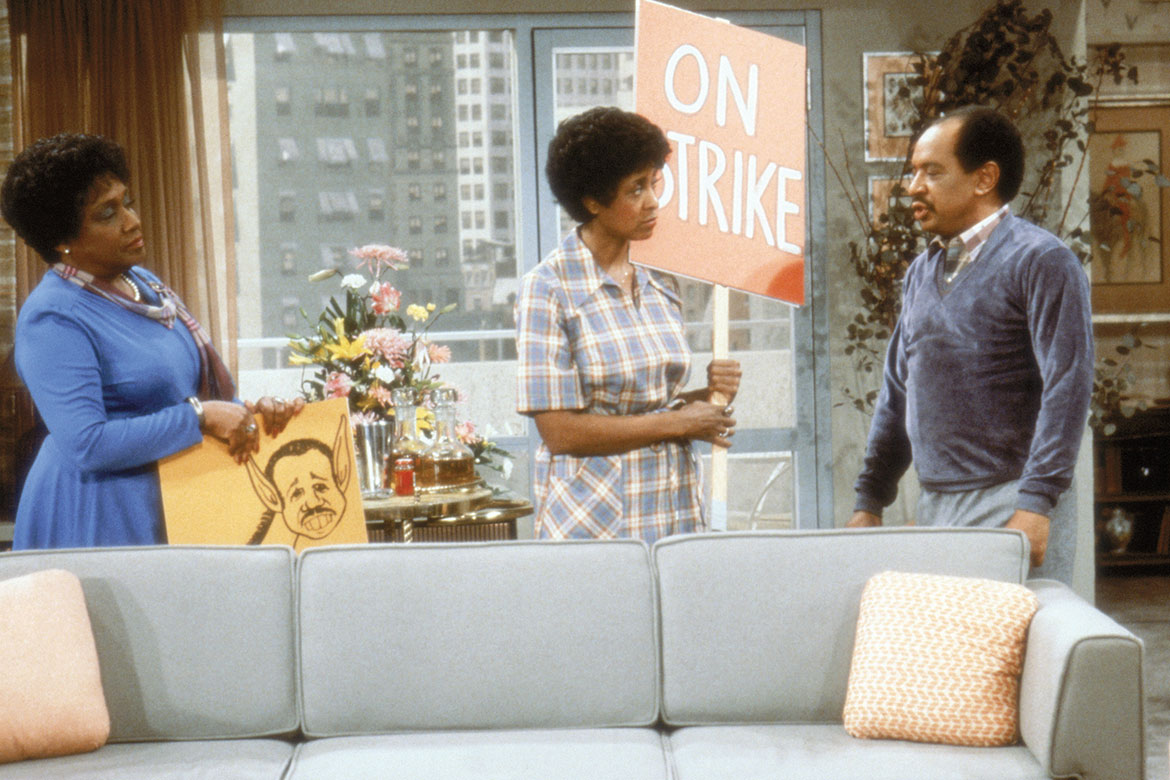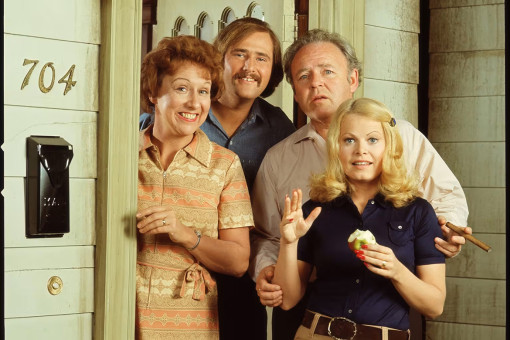When asked how audiences reacted to controversial material on the classic CBS sitcom The Jeffersons, Berlinda Tolbert tells a story about the n-word.
Tolbert played Jenny, the biracial daughter of interracial couple Tom and Helen Willis, who were neighbors and sometimes friends of the Jeffersons. Centered on characters spun off from legendary TV producer Norman Lear's first sitcom hit, All in the Family, The Jeffersons featured a Black family that lived in a luxury high-rise apartment surrounded by rich white people and also the Willises.
In the first season's 12th episode, "Like Father, Like Son," George Jefferson (Sherman Hemsley) gives an expensive watch to his son, Lionel (Mike Evans). As Tolbert remembers it, Evans and Hemsley were rehearsing the scene in which the watch is presented. Lionel's mother, Louise "Weezy" Jefferson (Isabel Sanford), is not pleased with the watch's price tag.
"Mike went up to Isabel and started whispering in her ear, and Isabel started to laugh," Tolbert remembers. "And when they went to try it again, Weezy looked at her husband, George Jefferson, and said, 'N-----, please.'"
That phrase, sometimes used among Black folks to express exasperation, drew a huge laugh from the cast and crew, Tolbert says. So, even though Sanford was a little worried about the language, they used the ad-libbed line when taping the episode in front of a live audience.
"They said, 'That's one of the longest laughs we ever heard,'" Tolbert remembers producers telling Sanford. "And so, it was kept."
That, Tolbert says, was how The Jeffersons produced classic, pioneering sitcom moments — combining the deft comic instincts of a close-knit cast with writers and producers willing to push the envelope in depictions of race and class in America.
Now 93, Marla Gibbs is the oldest living member of the core cast. She played the Jeffersons' maid, Florence Johnston, as a recurring character in the early seasons. After table reads, the other actors would leave, but Gibbs would stick around to offer ideas, unaware that cast members were not expected to contribute.
"I wanted to know what the [producers and directors] were going to talk about; I didn't care what the actors were going to talk about," she says with a laugh. "I just wanted [my lines] to be real and authentic. I didn't think like most actors, because [back then] I was not a professional actor.
"But thanks to The Jeffersons, I became a professional actor."
As the show notches the 50th anniversary of its premiere, some of those who worked on it during its 11 seasons hail The Jeffersons as much more than a silly sitcom about a headstrong Black businessman and his family. They say The Jeffersons taught an adoring TV audience that there were Black families that didn't live in poor neighborhoods, and that a loving romance between two people of different races was possible.
"It's an interracial cast and interracial ensemble, and you really didn't see that much [back then]," says Jay Moriarty, who rose through the program's writing ranks to become an executive producer and showrunner of The Jeffersons with his partner, Mike Milligan, eventually working on the show through its seventh season.
Moriarty repeats a story Lear told in his 2014 memoir, Even This I Get to Experience. Lear says he decided to spin off a series featuring the upwardly mobile neighbors from All in the Family after members of the Black Panther party confronted him over the way Black people were depicted in another one of his classic sitcoms, Good Times (which was spun off in 1974 from Lear's sitcom Maude).
"Good Times was garbage," Lear wrote, quoting the Panthers, who were angry even though the show was the first U.S. network sitcom centered on a Black family with two parents. "Show's nothing but a white man's version of a Black family. ... Every time you see a Black man on the tube, he is dirt poor."
Lear's solution, Moriarty notes, was to create a sitcom featuring a Black man who'd worked his way up to own a chain of dry cleaners — "movin' on up," as the catchy theme song says, to a luxury high-rise apartment with a maid. (That catchy, gospel-tinged theme song, by the way, was sung and cowritten by Ja'Net DuBois, who played neighbor Willona Woods on Good Times.)
Damon Evans, who would eventually replace Mike Evans as Lionel (the two actors are not related and never actually met) says that, even though he had a tough time on the show, he accepted the role because the characters were groundbreaking.
"[The Jeffersons showed] we could aspire to things and achieve them," Damon says. "I think of kids who didn't even know they could get past the projects until they saw The Jeffersons. So that's the legacy."
Moriarty adds, "When I was working for The Jeffersons, I felt like I was contributing something to society. They were showing something that hadn't been on TV before. You couldn't see a show like this when I was growing up in the '60s. And it's all because of Norman, because he wanted to do that stuff, and it worked."
Gibbs describes the show's continuing appeal more simply: "People are still watching it, because they connect with it. [It presented issues] they never had an opportunity to think about. But now they can not only think about it, they can laugh about it."
 Isabel Sanford, Marla Gibbs and Sherman Hemsley. Photo Credit: CBS/Photofest
Isabel Sanford, Marla Gibbs and Sherman Hemsley. Photo Credit: CBS/Photofest
Casting The Jeffersons proved challenging, even though the show was spun off from Lear's most successful sitcom.
The characters first surfaced when a Black family moved in next to the Bunkers early in the run of All in the Family. At first, only Louise and Lionel appeared on the show, and George remained offstage.
In Lear's book, he says they held off casting George Jefferson, because Sherman Hemsley was touring in a production of the musical Purlie Victorious, and the producer wanted him for the part. Instead, they had George's brother Henry (Mel Stewart) occasionally show up to trade insults with Carroll O'Connor's cluelessly bigoted Archie Bunker.
But Jay Hammer, who played the Willises' son Allan, says Hemsley was also tough to contact while he was touring. "When they wanted to cast him, they couldn't find him," Hammer says, laughing. "Every time they caught up to his location, he had moved to the next city."
Once Hemsley took on the role, he knocked it out of the park — countering Archie Bunker's bluster with his own witty, wiry energy. The key to successful sitcom acting — especially in Lear's shows, which were more grounded in reality than many TV comedies of the day — is in making the jokes sound natural and funny.
Though he was a little shy, given to wearing T-shirts and sneakers off-screen, Hemsley gave George Jefferson a cocky attitude on-screen — right down to a kinetic strut that inspired a popular dance move. George was irresistible to watch and a commanding on-screen presence.
In a conversation for The Interviews: An Oral History of Television (formerly known as the Archive of American Television), Hemsley, who died in 2012, talked about what had inspired George Jefferson's bluster. "Experiences ... friends I grew up with in South Philly ... walking, the way we walked, you think you're bad, you gotta be important," he said. "The walk happened when we were doing a scene where we kept going into [the Jeffersons' apartment building]. We had done seven or eight takes, and then we started clowning around. That's the one they kept."
In a different conversation for The Interviews, Sanford — who died in 2004 — said she resisted moving from All in the Family to a spinoff until producers told her they would likely write off the Jeffersons' characters if they didn't shift into a new show.
Because Gibbs was playing a recurring character who didn't appear in every episode, she kept her job as a reservations agent at United Airlines through the show's early seasons. "A bird in the hand was worth 20 in the bush," she says, noting she didn't quit her day job until producers asked her to take a leave to focus on the program.
Franklin Cover was cast as Tom Willis, and Roxie Roker was cast as Helen Willis. Lear wrote in his book that she answered his questions about any discomfort she might have playing the Black wife in an interracial marriage by showing him a picture of her real-life husband, TV producer Seymour Kravitz, who was white. (Roker, who died in 1995, was mother to rock star Lenny Kravitz.)
Tolbert says that during a meeting that turned out to be an audition, the producers also asked her how she felt about interracial relationships. She told them her father was biracial.
"Most importantly to me, I wanted this girl whose name was Jenny to be healthy and to be whole," Tolbert says. "[I wanted her] to think nothing of the fact that her mom was Black and her father was white, because it was all she ever knew. And all that she ever knew was love and support."
Hammer, who is white, says that when the show was casting the Willises' son, Allan, his agents were afraid to ask if he would play the biracial son of an interracial couple. So, they got their secretary to go to lunch with him and ask.
"I thought to myself at the time, 'They never called me up to ask, "Would you play a mugger?" like I did on [police drama] Adam-12, or a kidnapper, like I did on Mannix,'" says Hammer, who would later spend many years as Fletcher Reade on the CBS soap opera Guiding Light. "But I did get asked that question, 'How would you feel playing a Black person?' I just said, 'Yeah, I would do that!'"
Even though George Jefferson often called Jenny and Allan "zebras" and regularly tossed insults at the Willises over their interracial marriage, Moriarty insists that he never saw Hemsley's character as the Black version of Archie Bunker.
Moriarty tackled the subject in his own 2019 memoir, titled Honky in the House: Writing & Producing The Jeffersons. He noted that, unlike Archie Bunker, George Jefferson rose above his limited education and financial means to become a successful businessman. His jibes about white people came from a lifetime of overcoming obstacles that white society placed in his way to keep him down.
"Archie is a victim, willing to live within the rules and limitations that were thrust upon him. He's content to be white," Moriarty wrote. "George, on the other hand, is a hero, willing to fight a system that continues to be stacked against him and beat Whitey at his own game."
Moriarty still bristles at what he calls in his book "the question": How can a staff of almost all white writers create 11 seasons of a sitcom about a Black family?
"Ask a Black person whether they can write a white show ... of course they can," the producer says. "Why would you think they could do that, though, if the cultures are so different?"
To read the rest of the story, pick up a copy of emmy magazine here.
This article originally appeared in its entirety in emmy magazine, issue #3, 2025, under the title "Movin' Up & Crackin' Wise."












